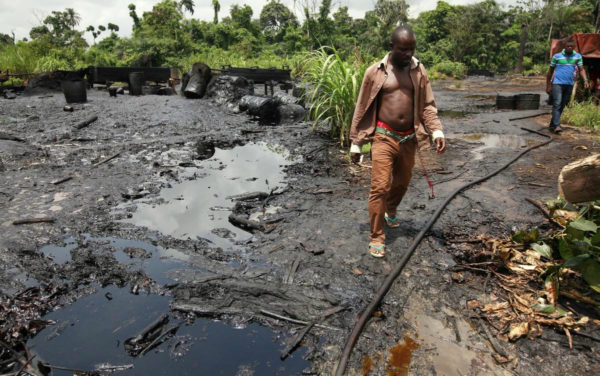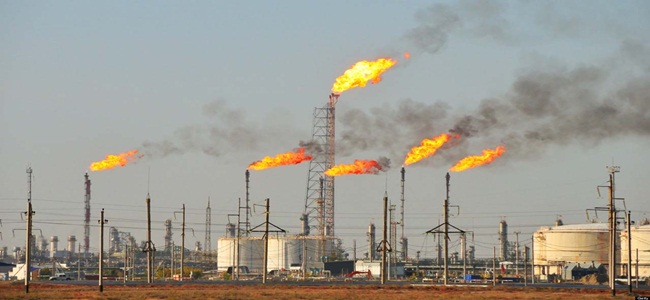In this post we will be looking at the meaning of Gas Flaring and Climate Change, the effect of gas flaring on Climate Change in Nigeria. Flared Gas Commercialization, Gas Flaring Offenders Penalties in Nigeria and many more.
INTRODUCTION
Nigeria is a major producer and exporter of oil and gas in the world. Most oil and gas exploration activities take place in the Niger Delta region of the country where there is high rate of gas flaring from oil and gas production. Although the federal Government of Nigeria had directed all oil and gas producing companies to reduce gas flare to a minimum by 2008 and stop total gas flaring by 2010 due to its effects on the environment and climate. Oil and gas companies are yet to implement these directives, making the country suffer intensive climate change, environmental degradation, revenue losses, chronic energy shortage, e.t.c.
Despite the directive passed by the Nigerian Government declaring gas flaring technically, economically, environmentally and totally unacceptable, the oil and gas companies still flares billions of cubic meters of gas yearly. A huge amount of suffering, repression, depression, degradation, pollution and climate change have accompanied this long practice of gas flaring. Natural gas flaring emanating from hydrocarbon exploration has been internationally and locally acknowledged as a significant source of greenhouse gas emission and a major contributor to climate change. During combustion process, gaseous hydrocarbons react with atmospheric oxygen to form carbon monoxide (CO) – Incomplete combustion and carbon dioxide (CO2) – Complete combustion.
Read: Oil & Gas Permits/ Licenses in Nigeria
Gas flaring also causes acid rain, produces air pollution and causes severe impact on the environment. This paper will extensively highlight the negative effects and impact of gas flaring, how greenhouse gases emission from gas flaring affects climate change, the environment and human lives and also proffer pragmatic and strategic measures to combat this unsafe, unhealthy and unfriendly practice in Nigeria.
WHAT IS GAS FLARING?
Gas flaring is the burning of natural gas associated with oil extraction. The practice has persisted from the beginning of oil production over 160 years ago and takes place due to a range of issues, from market and economic constraints, to a lack of appropriate regulation and political will. Flaring is a monumental waste of a valuable natural resource that should either be used for productive purposes, such as generating power, or conserved. Gas flaring is the burning of unwanted natural gas in oil wells. Globally, the practice has persisted since oil production started over 160 years ago. Nigeria is a leading offender, despite gas flaring being illegal since 2005.
The toxic fumes cause many environmental and health problems, and the practice increases the risk of global warming. Gas flaring occurs due to poor regulation and commitment to tackle the problem. Both characterize Nigeria’s oil-rich Niger Delta region. Recent Gas flaring satellite data reveals that Nigeria has remained one of the top seven countries since 2012. These states produce 40% of the world’s oil each year and account for 65% of global gas flaring. Between 2016 and 2020, Nigeria flared 1 252.26 trillion cubic feet of natural gas into the atmosphere, according to the Nigerian National Petroleum Corporation’s monthly oil and gas reports.
Read: Gas Flaring Offenders Penalties
In 2005, Nigeria’s courts ruled that oil companies stop flaring gas in the Niger Delta. The judgment was made in a case filed by the Iwherekan community against Shell Petroleum Development Company, Nigerian National Petroleum Corporation and Nigeria’s Attorney General. The court held that gas flaring was unconstitutional as it violated people’s right to life and dignity. Flaring persists to this day because it is a relatively safe, though wasteful and polluting, method of disposing of the associated gas that comes from oil production. Utilizing associated gas often requires economically viable markets for companies to make the investments necessary to capture, transport, process, and sell the gas.
WHAT IS CLIMATE CHANGE?
Climate change is periodic modification of Earth’s climate brought about as a result of changes in the atmosphere as well as interactions between the atmosphere and various other geologic, chemical, biological, and geographic factors within the Earth system. The atmosphere is a dynamic fluid that is continually in motion. Both its physical properties and its rate and direction of motion are influenced by a variety of factors, including solar radiation, the geographic position of continents, ocean currents, the location and orientation of mountain ranges, atmospheric chemistry, and vegetation growing on the land surface. All these factors change through time.
Some factors, such as the distribution of heat within the oceans, atmospheric chemistry, and surface vegetation, change at very short timescales. Others, such as the position of continents and the location and height of mountain ranges, change over very long timescales. Therefore, climate, which results from the physical properties and motion of the atmosphere, varies at every conceivable timescale. Human activity leads to change in the atmospheric composition either directly (via emissions of gases or particles) or indirectly (via atmospheric chemistry).
Read: Flared Gas Commercialization in Nigeria
Anthropogenic emissions have driven the changes in WMGHG concentrations during the Industrial Era. Radiative forcing (RF) is a measure of the net change in the energy balance of the Earth system in response to some external perturbation; positive RF leads to a warming and negative RF to a cooling. The RF concept is valuable for comparing the influence on global mean surface temperature of most individual agents affecting the Earth’s radiation balance.
The Effect of Gas Flaring on Climate Change in Nigeria

Gas flaring is a typical catastrophe with varying implications for the nation. For these implications, there is increasing public criticism against its continued practice. The critics aim at creating awareness, for the well-being of host communities of the oil flow stations in the Niger Delta, about the impacts of flaring gas. In Nigeria’s Niger Delta, the flaring process is usually very close to residents and farmlands and has been implicated in serious environmental degradation of the region. Gas flaring and consequent carbon dioxide emissions contribute greatly to deforestation and climate change, leading to overheating, heavy rainfall and flooding as well as soil erosion. Also, in this era of rising gas utility, both for domestic and export needs, flaring is an economic wastage.
According to Madueme, the economic cost of total gas flared is quite staggering, which implies a great wastage of investment opportunities to the sector and expected contribution to gross national income of the nation. The associated impacts of gas flaring can be divided into direct and indirect contributions and are evaluated in terms of their influence on changes to the ecosystem. A typical indirect contribution is prevalence of security risks, including youth restiveness and other social strife. It is remarkable too that many issues surrounding the flaring such as amount of equivalent energy wasted, quantity of carbon (IV) oxide emission potentials and final position of regulatory policy on the matter are vague to the people. when oil companies burn off extra gas that escapes as a result of oil drilling.
Gas flares burn several stories high throughout the Niger Delta, often within a few hundred yards of communities. Some flares, like the one pictured here, have been burning constantly day and night for over 30 years. People living in villages near the flares suffer from polluted air and water, and contract asthma and cancer as a result of breathing flare smoke.
Read: Foreigner’s Guide to Start Business in Nigeria
- Flares contain as many as 250 toxins and flares emit particulate matter, including sulfur dioxide, nitrogen dioxides and carcinogenic substances as well as unburned fuel components, including benzene, toluene, xylene, and hydrogen sulfide, according to the Canadian Public Health Association. Exposure to several of these substances causes cancer and blood-related disorders.
- Flare smoke can cause aggravated asthma, increases in respiratory symptoms like coughing and difficult or painful breathing, chronic bronchitis, decreased lung function, and premature death, according to the U.S. Environmental Protection Agency.
- Flaring creates acid rain, which corrodes the metal roofs that are often used in the Niger Delta. The rain also acidifies lakes and streams and can kill vegetation.
Gas flaring also contributes to climate change. With so much gas being burned off and wasted, it is estimated that flaring in Nigeria has produced more greenhouse gas emissions than all other sources in sub-Saharan Africa combined.
CONCLUTION
In Nigeria, only 40 percent of people have access to electricity. There is a real need for flared gas to be processed, distributed, and used for fuel for cooking or for electricity production. Using processed natural gas as fuel for cooking would replace the firewood that many Nigerians use for cooking and improve indoor air quality. Gas could also be re-injected back into the ground, a cleaner option that would keep the gas from being burned and creating greenhouse gases.

